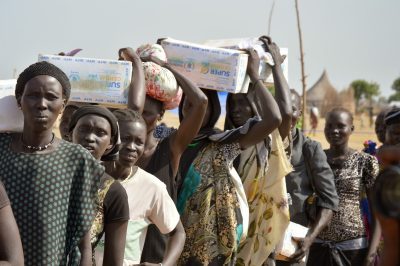By
Peter Louis
As a result of the ongoing conflict, skyrocketing inflation and collapsed markets are pushing people in South Sudan to breaking point as the political deadlock enters its 16th month, families facing their second ‘lean season’ since fighting began, international agency Oxfam warned today.
“What we’re seeing now is families that have spent the past year and a half living on the edge – many have exhausted their food stocks, been displaced from their homes, missed opportunities to plant and farm, and now the economy is showing the strain of a year and a half of conflict,” according to an Oxfam representative in South Sudan.
Areas affected by the conflict are seeing drastic increases in food prices. In February, cereal prices were estimated to have shot up by 300% in the states of Unity, Upper Nile and Jonglei.
The South Sudanese pound is also depreciating rapidly. While the official rate remains at 3.2 pounds to the US dollar, parallel market rates are as high as 7 pounds to the dollar which is fluctuating on a regular basis. This is increasing the cost of regional food imports and putting pressure on already stretched household budgets.
Many people can no longer afford to buy food and other basic essentials; trade in markets has been disrupted, or in many instances, markets have been damaged or destroyed altogether.
Already, 2.5 million people are facing severe levels of hunger. By June, the Famine Early Warning Systems Network (FEWSNET) predicts that more than a million people will join them.
The South Sudanese representative of Oxfam was keen to emphasise the importance of aid reaching people not just in the camps on UN bases but the millions in need spread out across the country, especially in conflict affected states.
Insecurity due to protracted fighting and poor roads mean that in many places agencies have to fly everything in, often to airstrips that are easily bogged down by mud and rain, so getting food and essential items in before the rains start is an urgent priority for agencies.
Aid is important and lifesaving but ultimately what people need most is an end to the conflict. A real, lasting peace that delivers genuine security and stability will require far more than a power sharing deal between political and military elites. Regional leaders and the international community have an important role in helping communities and the country’s leaders to achieve a lasting peace. Complacency is not an option.



No Comments Yet!
You can be first to comment this post!